Amstrad NC100
At a nerdy flea market, I couldn’t withstand and brought home this gem: an Amstrad NC100.

It’s a lovely little portable computer, a bit larger than a sheet of A4 paper, and of course a lot thicker. It uses the famous Z80 CPU, an ample 64 kB of RAM, and a really really bad 80x8 characters LCD screen. On the back, there are a connector for a printer and a serial port (so that content can actually be transferred to other devices). There also is a PCMCIA slot that can be used to boost the memory to 1 MB.
The NC100 comes with a standard variety of software built right into the firmware: a text processor, an address book, a calculator, and a BASIC interpreter (of course).
This machine is powered by four AA batteries, and supposedly lasts for 20 hours. There also is a CR2032 cell to make sure the memory doesn’t vanish. Oh, and the keyboard is awesome because it’s full size, and the mechanical keys are quite good.
Amstrad introduced the NC100 to the market in 1992. From today’s perspective, where every smart phone can do more than this, it looks laughable, but remember its age. Back then, portable computing used to be clunky.
What do I do with it, you ask? Nothing in particular, I just like to grow my collection of old but functioning hardware.
Tags: the-nerdy-bit
Data-Driven
The term “data-driven” has been giving me an itch for a long time: being driven by data just sounds wrong. Data are raw. Insight, understanding, knowledge - these are all much more worthwhile. They’re derived from data. A better term, in my opinion, is “data-oriented”, where the data don’t drive us, but help us with orientation, and choosing direction. It’s not the data that are in charge. We are.
I was happy to come across this piece that argues one should be driven by good arguments rather than by data. It’s great for its pragmatism, as it makes very clear that there’s nothing wrong with involving data in decision making in principle. The situations to watch out for are those when bad arguments involving data are valued over good ones that don’t, and when metrics are introduced where data can’t realistically be the foundation of good arguments.
Metrics, especially. Don’t we all just love a good dashboard? Basing too much or everything on metrics only will replace intrinsic motivation (which is empirically proven to be a major contributor to satisfaction) with the extrinsic kind provided by metrics. Those dashboards need to make sense, or rather: they have to support people in making sense of what they do.
Tags: work
Early Polyphony
Interested in some really old polyphonic music? Read on.
Consider Pérotin, 12th/13th century composer, probably in Paris. He was one of the first to introduce three- and four-part singing. The music definitely has that “mediaeval” sound to it, and it has a very different pace from what we usually associate with “classical” or even “renaissance” music. For example, his organum “Viderunt Omnes”, here performed by the Hilliard Ensemble.
Fast-forward to the 15th century, and to Antoine Brumel. His Missa Et Ecce Terrae Motus requires a 12-part choir (mind you, this was 600 years ago!) and takes about 40 minutes to perform. The complexity is simply astounding, and the music requires rather accomplished singers. It is also fascinating how the composition is actually a comment, an interpretation of the text of the Latin mass. Voilà.
Tags: music
Look or Stay Stupid?
I often say that when I don’t understand something, I’m facing the decision to look stupid or stay stupid by asking or not asking a question. I’ve practiced this take since my university days, and have been looked at down people’s noses more than once for it. And yet, I’ve learned something on each of these occasions, which has helped in hindsight.
Imagine my satisfaction when I learned that this take of mine is backed by empirical research. Hooray!
The article is a bit older, and I’ve been aware of Carole Dweck’s work for a while, but hadn’t made this connection until very recently.
Tags: work
Among Tree Tops
A while back, my family and I spent a day amongst the tree tops in Beelitz-Heilstätten, which we had long planned to do. I can only recommend this. Where else can you see a forest growing on top of a building? If you’re scared of heights (like me), it helps to constantly remind yourself that yes, these constructions are safe even though they’re 20m above ground, and it’s kind of OK, but the gentle swaying of the bridges in the wind doesn’t help. I made it safely up and back down, and would not mind doing it again.



Tags: misc
Pac Man!
I built a Lego thing. This time: Pac Man! It’s a gaming classic that I’ve played a lot on a C64. I was intrigued when I saw the box at a Lego store, and wanted to build it to see how the mechanics are working (of course it has moving parts).
Of course, it all starts with a big pile of numbered bags. The first thing that gets assembled is the little Pac Man hunt that sits on top of the machine. You can push a button to make the Pac Man and ghosts turn (which is what happens in the game, too).
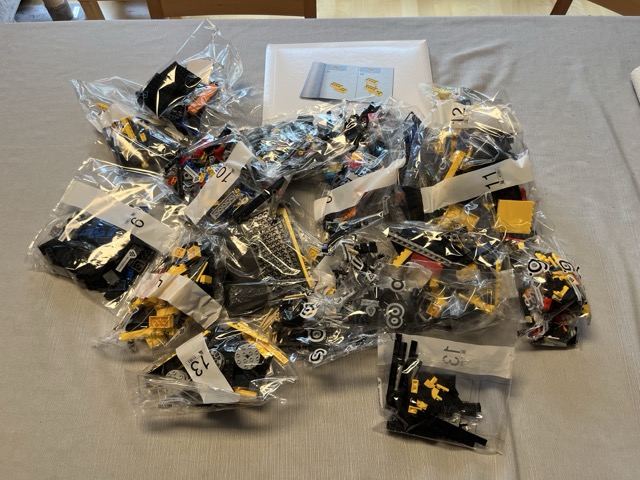
Next, the frame of the big arcade machine is built (notice the crank!), and of course this part needed Curly’s quality control. She approved.
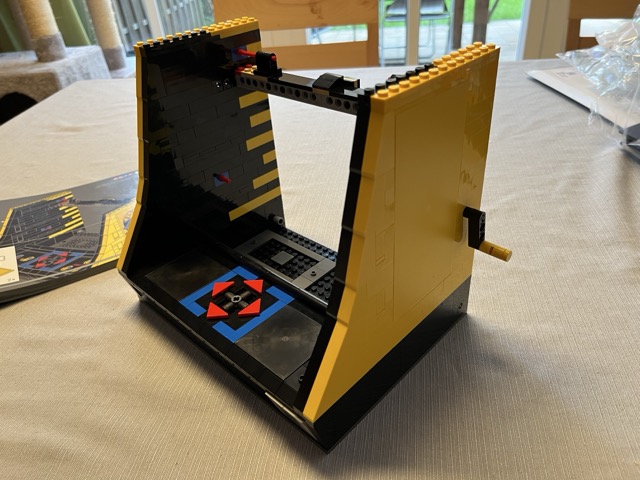
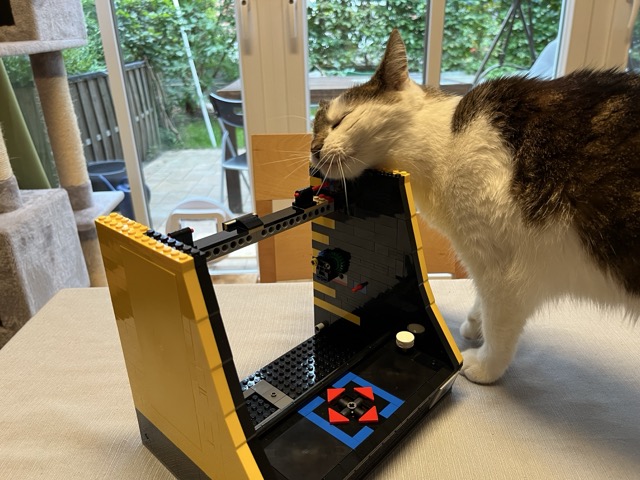
The rather realistic screen was built next. I have to say, this is one of the most finicky pieces of Lego I’ve ever assembled. That’s for a reason: there are moving parts, as the screen, when the crank on the arcade is turned, will simulate part of the gameplay, and the little icons actually move about the scene. This is an amazing example of Lego engineering, and very rewarding indeed. The way a single axle, powered by the aforementioned crank, moves all the parts, is ingenious.
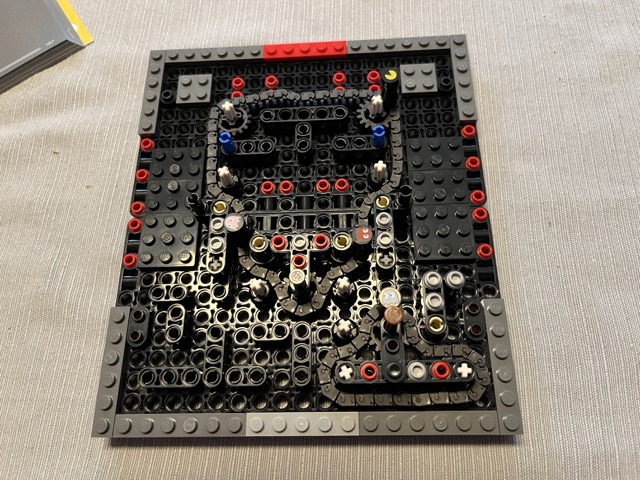

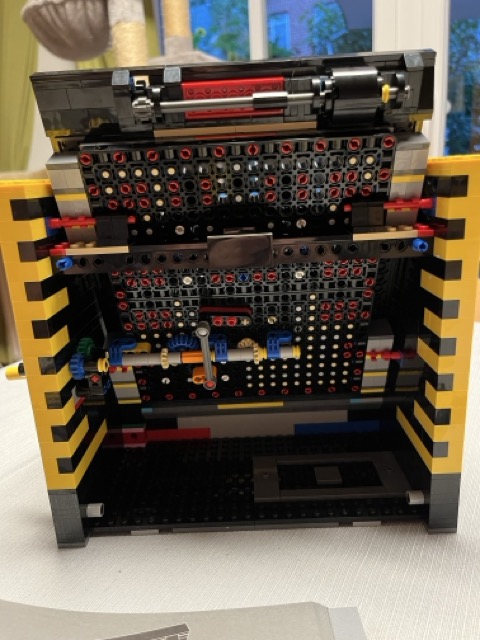
Here’s how it looks in real life.
The finishing touches include building the top part of the arcade machine (proud and tired builder visible in the window reflection), and a little bit of playful scenery that’s well hidden inside the big box (notice the mini replica of the game, and the bubble gum dispenser?).
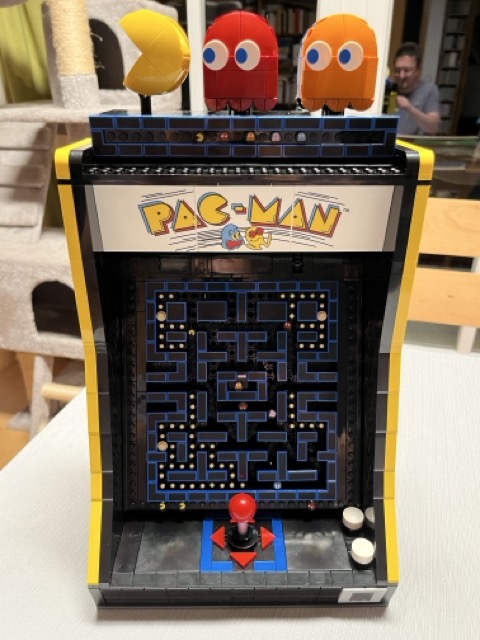
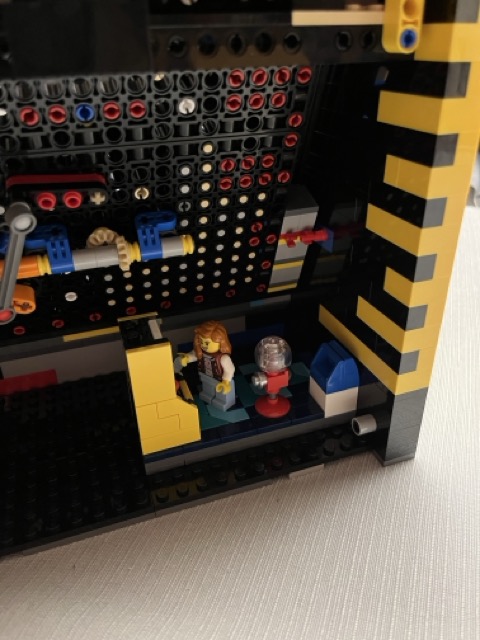
Assembling the set took me about 6 hours in total. I’m not a speed builder (boo), but one who likes to relish in the details, enjoy picking the parts, and even more enjoy assembling them. This set brought a lot of joy.
Tags: the-nerdy-bit
ssh Tips
Most of us technical people are using ssh in one way or another. I came across a posting that laid out some of the features of ssh for me in a very clear way, and gave me some insights into features I hadn’t in my active working memory. Here it is.
Tags: hacking
WFH, RTO, Whatever
Is working from home better? Is working in the office better?
In these very polarised times, it just has to be one or the other. There is no room for nuance. The exchanges on Twitter (occasionally called X now) and LinkedIn look just like this was just another one of those highly contentious, inevitably partisan, issues.
Frankly, I’m quite fed up with humanity’s renewed knack for tribalism. The question I asked above is just one example that happens to be a good fit for this blog. There are endless others.
So. Is working from home better? Is working in the office better? It depends. My answer to that is not so simple as some would have it.
If I have a task in front of me that requires some deep thinking, analysis, reading, research, and writing, I prefer to work from home. There are just less distractions there. Don’t get me wrong - I love meeting the colleagues. I also love the occasional coffee machine chat (I sit near the kitchen when I’m in the office for a reason), but my tendency to freely engage in those can just be counterproductive.
If, on the other hand, I have a day that’s devoted to a mix of focus time and meetings, with no big-and-deep task of the aforementioned nature on the plate, I prefer to be in the office.
Tertium datur: If I have a day with small bits of focus time sprinkled in between a lot of meetings, it doesn’t really matter where I work. I have a slight preference for the office because the occasional coffee machine chat also has a relaxing effect. Some plainly social interactions between meetings take some of the stress out of the frequent context switches.
What’s the point? Companies seem to scramble a bit at the moment. Some mandate a fixed number of office days per week, some leave everything completely open. I think counting and enforcing a number of office days is simply using the wrong metric. It’s like measuring productivity by counting hours spent in front of a screen.
What counts is whether the outcome is right. If, for that to be the case, it is necessary to have everyone in the office for some particular purpose, then so be it, and it is even fine if a company mandates that. Otherwise, it should be fine for people to work from the office or from home however they see fit.
Tags: work